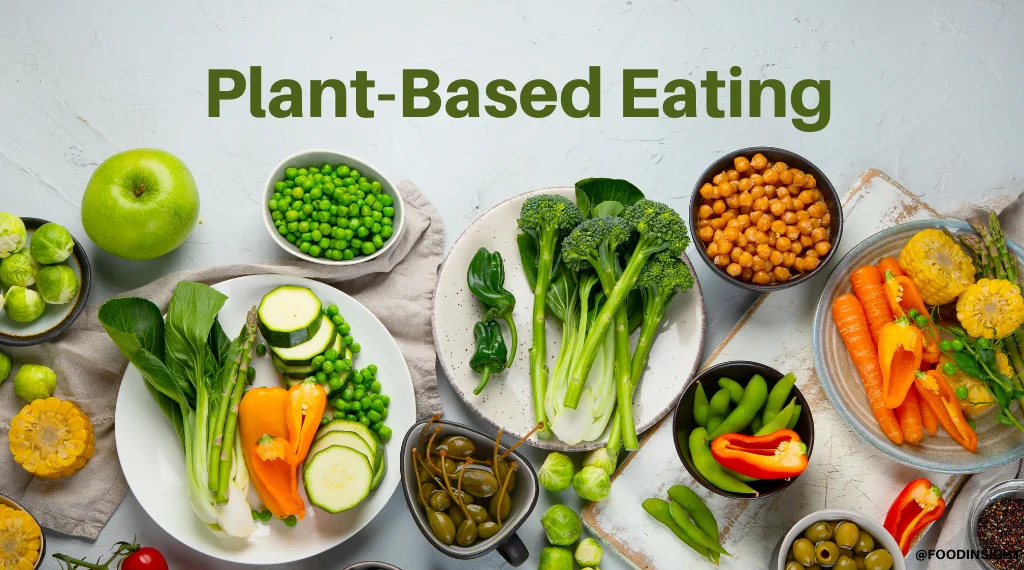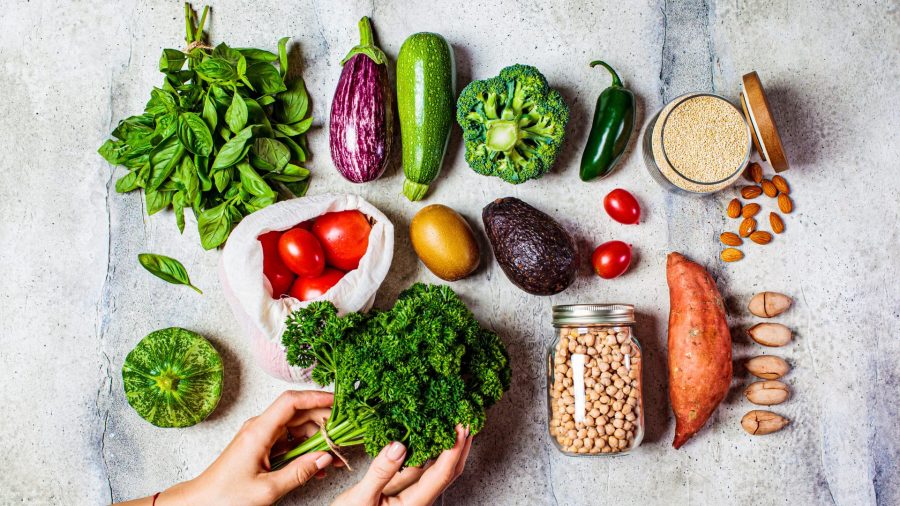How Gluten Free BBQ Sauce Elevates Your Vegan Grilling Game
How Gluten Free BBQ Sauce Elevates Your Vegan Grilling Game
Blog Article
Everything About Healthy Food: Advantages of Enjoying Plant Based Alternatives
The discussion bordering plant-based diet regimens has actually obtained considerable interest over the last few years. Many individuals are checking out the prospective health and wellness benefits, dietary benefits, and environmental influences related to these dietary options. As people end up being more familiar with their food's influence on wellness and sustainability, concerns emerge about the practicalities of embracing such a lifestyle. What specific changes can one anticipate, and exactly how might these choices improve not only personal health and wellness however likewise the planet's future?
Understanding Plant-Based Diet Plans
Lots of individuals associate plant-based diet plans mostly with vegetarianism or veganism, these diet plans can encompass a large variety of eating patterns that prioritize whole, minimally processed plant foods. Such diet plans often include fruits, veggies, whole grains, vegetables, nuts, and seeds, while getting rid of or limiting animal products. This versatility permits individuals to customize their dietary selections according to personal choices and nutritional requirements. Some might adopt a mostly plant-based diet regimen while still periodically consuming meat or milk, often described as a flexitarian method. The emphasis continues to be on integrating even more plant foods, which can cause a varied array of flavors and meals. Comprehending these different analyses of plant-based eating is important for appreciating its access and appeal in modern food society.
Health And Wellness Conveniences of Plant-Based Foods
The wellness advantages of plant-based foods are significant, supplying a nutrient density advantage that sustains total well-being. Research study indicates that these foods can enhance heart wellness and play a crucial function in reliable weight management. By including a lot more plant-based options, individuals may enhance their dietary selections and promote lasting wellness.
Nutrient Density Benefit
Nutrient density plays a crucial role in the health benefits of plant-based foods, making them a compelling selection for those seeking a balanced diet regimen. Plant-based foods, such as fruits, vegetables, legumes, nuts, and entire grains, are usually rich in crucial vitamins, minerals, and antioxidants while being reduced in calories. This high nutrient thickness permits individuals to take in fewer calories while still satisfying their dietary requirements. In addition, these foods are loaded with nutritional fiber, promoting digestive wellness and assisting in weight administration. By incorporating nutrient-dense plant-based alternatives, customers can enhance their general health and wellness, support their immune systems, and reduce the threat of chronic conditions. Ultimately, the nutrient thickness of plant-based foods underscores their relevance in a health-conscious lifestyle.
Heart Health Improvement

Weight Administration Assistance
In enhancement to promoting heart health and wellness, a plant-based diet plan can significantly aid in weight monitoring. This dietary method stresses whole foods such as fruits, vegetables, beans, nuts, and entire grains, which are typically lower in calories and greater in fiber compared to animal-based products. The high fiber material assists raise satiation, minimizing general calorie consumption. Plant-based diets are typically rich in crucial nutrients while reduced in harmful fats, making it simpler to maintain a healthy weight. Research indicates that individuals who adopt a plant-based lifestyle have a tendency to have reduced body mass indexes (BMIs) and experience even more effective fat burning contrasted to those who eat meat-heavy diet regimens. Embracing plant-based choices is a critical option for effective weight monitoring.
Nutritional Worth of Plant-Based Components
Plant-based components are abundant in necessary nutrients, using a diverse variety of vitamins, minerals, and anti-oxidants that add to general health and wellness. A contrast of protein sources exposes that while pet items are frequently deemed remarkable, numerous plant-based alternatives provide adequate healthy protein and other advantageous compounds. Comprehending the dietary value of these ingredients can help individuals make notified dietary selections.
Crucial Nutrients in Plants
Nutrient-rich components found in plants use a varied variety of important nutrients that add significantly to general wellness. These ingredients are rich in vitamins A, C, and K, which sustain immune feature, vision, and blood clot, specifically. In addition, plants give vital minerals such as magnesium, potassium, and calcium, important for heart wellness, muscle feature, and bone strength. The visibility of fiber in plant-based foods help digestion and promotes a healthy intestine microbiome. Antioxidants, located abundantly in veggies and fruits, assistance battle oxidative tension and minimize inflammation. Many plant foods are reduced in calories yet high in nutrients, making them a superb choice for those looking for to preserve a healthy weight while making certain optimal nutrient consumption.

Comparing Protein Sources
Protein sources vary considerably in their dietary accounts, with plant-based components supplying special go to my site advantages. Unlike pet healthy proteins, which frequently include hydrogenated fats and cholesterol, plant proteins have a tendency to be lower in these undesirable elements. Legumes, nuts, seeds, and entire grains are abundant in essential amino acids, fiber, vitamins, and minerals. Lentils provide high healthy protein material alongside substantial iron click to read more and folate, while quinoa is a total protein, using all 9 vital amino acids. Additionally, plant-based proteins are typically accompanied by antioxidants and phytochemicals that sustain overall wellness. The change to plant-based healthy protein resources not only boosts dietary consumption but also lines up with sustainable dietary practices, reducing ecological influence and promoting lasting health and wellness benefits.
Ecological Effect of Plant-Based Consuming
As recognition of environment modification expands, numerous people are discovering lasting nutritional choices that can substantially minimize their environmental footprint. Plant-based eating has actually arised as a significant factor to decreasing greenhouse gas exhausts, which are largely related to animals production. The growing of fruits, legumes, grains, and vegetables normally needs less resources, such as water and land, compared to pet farming. In addition, plant-based diet regimens can lead to decreased logging, as much less land is required for grazing livestock or expanding animal feed. By moving towards plant-based options, customers can support biodiversity and advertise much healthier ecological communities. On the whole, welcoming plant-based consuming not just advantages individual wellness but additionally represents a crucial step toward ecological sustainability and preservation efforts.
Overcoming Common Misconceptions
While lots of individuals identify the advantages of a plant-based diet regimen, several false impressions often deter them from totally embracing this lifestyle. An usual idea is that plant-based diets lack sufficient healthy protein; nevertheless, countless plant sources, such as beans, nuts, and tofu, offer ample protein. Additionally, some think that this diet is expensive, when in truth, staples like beans, rice, and seasonal veggies can be fairly affordable. One more mistaken belief is that plant-based consuming is overly limiting, whereas it in fact uses a varied selection of foods and flavors. Many worry that a plant-based diet plan might lead to deficiencies, yet with proper preparation, people can get all required nutrients, including minerals and vitamins, while taking pleasure in a broad selection of scrumptious meals. Broad Tips for Transitioning to a Plant-Based Way of living
Making the shift to a plant-based way of life can be an enhancing experience, though it commonly calls for some support to navigate the first modifications. Initially, people are urged to start gradually, integrating more fruits, veggies, legumes, and entire grains into their dishes while minimizing meat and dairy intake. Dish planning is essential; preparing a weekly menu can help ease the modification and prevent last-minute unhealthy selections. Exploring cooking methods and new dishes can also improve the experience and preserve exhilaration about plant-based eating. Additionally, signing up with support system or areas can provide inspiration and share beneficial pointers. Remaining informed concerning nourishment guarantees balanced dishes, protecting against deficiencies while fostering a healthy, rewarding plant-based way of life.

Delicious Plant-Based Meal Ideas
Discovering delicious plant-based meal ideas can motivate individuals to welcome a more nutritious diet plan. One popular alternative is a hearty quinoa salad, featuring cherry tomatoes, cucumber, and a tangy lemon-tahini clothing. An additional fave is a full-flavored lentil stew, loaded with carrots, celery, and great smelling herbs, excellent for a reassuring supper. For breakfast, overnight oats made with almond milk, chia seeds, and covered with fresh berries supply a nourishing start to the day. Additionally, a vivid veggie stir-fry with tofu and a range of colorful veggies can be a quick yet pleasing meal. Velvety avocado salute on whole-grain bread, sprayed with seeds and spices, offers a basic yet delicious snack. These meals display the variety and splendor of plant-based eating.

Frequently Asked Concerns
Can a Plant-Based Diet Plan Give Sufficient Protein?
The inquiry advice of whether a plant-based diet regimen can offer enough protein is common. Many sources, consisting of vegetables, nuts, seeds, and entire grains, can satisfy healthy protein requires efficiently, sustaining a well balanced and healthy diet plan for people.
Are Plant-Based Diet Plans Ideal for Kid?
The suitability of plant-based diet regimens for youngsters relies on cautious planning. Ample nutrients should be ensured, consisting of healthy proteins, vitamins, and minerals. With proper advice, such diet plans can support healthy and balanced growth and advancement in youngsters.
Exactly how Do I Eat in restaurants on a Plant-Based Diet regimen?
Eating out on a plant-based diet entails seeking restaurants with varied menus, requesting for adjustments, and discovering vegan-friendly options. Planning ahead and communicating dietary choices can enhance the eating experience while maintaining dietary selections.
What Are Typical Allergens in Plant-Based Foods?
Typical allergens in plant-based foods consist of soy, gluten, nuts, and seeds - BBQ Sauces. Individuals complying with a plant-based diet plan must understand these allergens and read tags thoroughly to prevent damaging responses and assure risk-free consumption
Can Plant-Based Diets Assist With Weight Management?
Research study indicates that adopting a plant-based diet may help with weight loss due to its usually lower calorie density and greater fiber web content. This mix can enhance satiation, assisting people handle their calorie consumption properly. Lots of people connect plant-based diet regimens generally with vegetarianism or veganism, these diet plans can encompass a wide array of eating patterns that focus on whole, minimally refined plant foods. Nutrient density plays a crucial function in the health advantages of plant-based foods, making them an engaging option for those looking for a balanced diet plan. Plant-based diet regimens have actually been shown to noticeably improve heart health and wellness, as they frequently consist of aspects that support cardio feature. In addition to advertising heart health, a plant-based diet plan can considerably aid in weight administration. An usual idea is that plant-based diet plans lack enough healthy protein; nevertheless, numerous plant resources, such as vegetables, nuts, and tofu, give sufficient protein.
Report this page